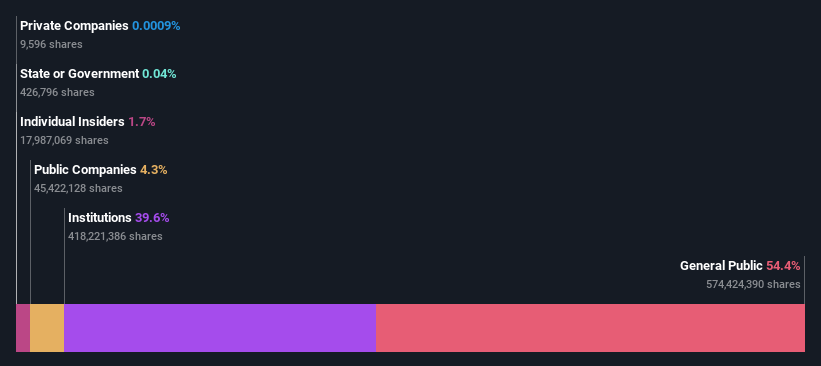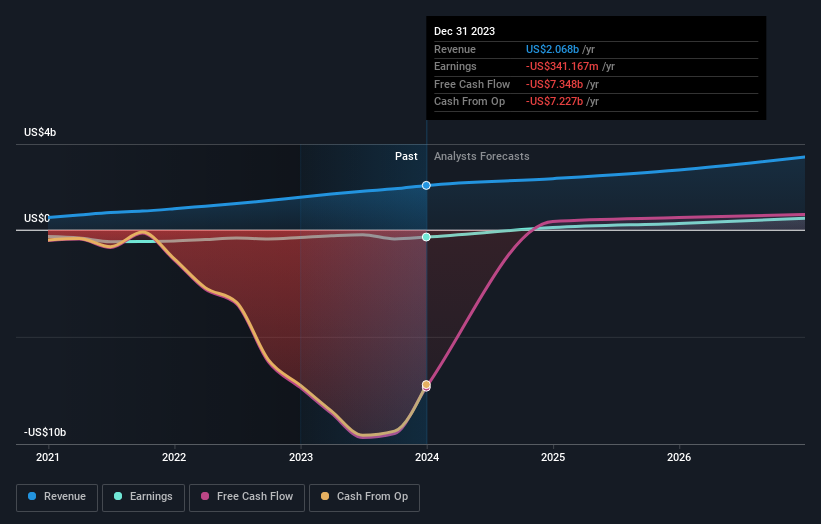While institutions own 40% of SoFi Technologies, Inc. (NASDAQ:SOFI), retail investors are its largest shareholders with 54% ownership
Key Insights
Significant control over SoFi Technologies by retail investors implies that the general public has more power to influence management and governance-related decisions
The top 25 shareholders own 35% of the company
A look at the shareholders of SoFi Technologies, Inc. (NASDAQ:SOFI) can tell us which group is most powerful. And the group that holds the biggest piece of the pie are retail investors with 54% ownership. Put another way, the group faces the maximum upside potential (or downside risk).
Institutions, on the other hand, account for 40% of the company's stockholders. Large companies usually have institutions as shareholders, and we usually see insiders owning shares in smaller companies.
Let's take a closer look to see what the different types of shareholders can tell us about SoFi Technologies.
Check out our latest analysis for SoFi Technologies
What Does The Institutional Ownership Tell Us About SoFi Technologies?
Institutions typically measure themselves against a benchmark when reporting to their own investors, so they often become more enthusiastic about a stock once it's included in a major index. We would expect most companies to have some institutions on the register, especially if they are growing.
We can see that SoFi Technologies does have institutional investors; and they hold a good portion of the company's stock. This implies the analysts working for those institutions have looked at the stock and they like it. But just like anyone else, they could be wrong. When multiple institutions own a stock, there's always a risk that they are in a 'crowded trade'. When such a trade goes wrong, multiple parties may compete to sell stock fast. This risk is higher in a company without a history of growth. You can see SoFi Technologies' historic earnings and revenue below, but keep in mind there's always more to the story.
Hedge funds don't have many shares in SoFi Technologies. The Vanguard Group, Inc. is currently the company's largest shareholder with 7.7% of shares outstanding. With 4.3% and 3.8% of the shares outstanding respectively, SoftBank Group Corp. and BlackRock, Inc. are the second and third largest shareholders. Additionally, the company's CEO Anthony Noto directly holds 0.8% of the total shares outstanding.
On studying our ownership data, we found that 25 of the top shareholders collectively own less than 50% of the share register, implying that no single individual has a majority interest.
While it makes sense to study institutional ownership data for a company, it also makes sense to study analyst sentiments to know which way the wind is blowing. Quite a few analysts cover the stock, so you could look into forecast growth quite easily.
Insider Ownership Of SoFi Technologies
The definition of company insiders can be subjective and does vary between jurisdictions. Our data reflects individual insiders, capturing board members at the very least. Company management run the business, but the CEO will answer to the board, even if he or she is a member of it.
I generally consider insider ownership to be a good thing. However, on some occasions it makes it more difficult for other shareholders to hold the board accountable for decisions.
We can report that insiders do own shares in SoFi Technologies, Inc.. This is a big company, so it is good to see this level of alignment. Insiders own US$128m worth of shares (at current prices). Most would say this shows alignment of interests between shareholders and the board. Still, it might be worth checking if those insiders have been selling.
General Public Ownership
The general public, mostly comprising of individual investors, collectively holds 54% of SoFi Technologies shares. With this amount of ownership, retail investors can collectively play a role in decisions that affect shareholder returns, such as dividend policies and the appointment of directors. They can also exercise the power to vote on acquisitions or mergers that may not improve profitability.
Public Company Ownership
Public companies currently own 4.3% of SoFi Technologies stock. It's hard to say for sure but this suggests they have entwined business interests. This might be a strategic stake, so it's worth watching this space for changes in ownership.
Next Steps:
It's always worth thinking about the different groups who own shares in a company. But to understand SoFi Technologies better, we need to consider many other factors. Case in point: We've spotted 2 warning signs for SoFi Technologies you should be aware of.
If you would prefer discover what analysts are predicting in terms of future growth, do not miss this free report on analyst forecasts.
NB: Figures in this article are calculated using data from the last twelve months, which refer to the 12-month period ending on the last date of the month the financial statement is dated. This may not be consistent with full year annual report figures.
Have feedback on this article? Concerned about the content? Get in touch with us directly. Alternatively, email editorial-team (at) simplywallst.com.
This article by Simply Wall St is general in nature. We provide commentary based on historical data and analyst forecasts only using an unbiased methodology and our articles are not intended to be financial advice. It does not constitute a recommendation to buy or sell any stock, and does not take account of your objectives, or your financial situation. We aim to bring you long-term focused analysis driven by fundamental data. Note that our analysis may not factor in the latest price-sensitive company announcements or qualitative material. Simply Wall St has no position in any stocks mentioned.

 Yahoo Finance
Yahoo Finance 

